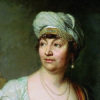Madame de Stael

Madame de Stael
Anne Louise Germaine de Staël-Holstein, commonly known as Madame de Staël, was a French woman of letters of Swiss origin whose lifetime overlapped with the events of the French Revolution and the Napoleonic era. She was one of Napoleon's principal opponents. Celebrated for her conversational eloquence, she participated actively in the political and intellectual life of her times. Her works, both critical and fictional, made their mark on the history of European Romanticism...
NationalityFrench
ProfessionWriter
Date of Birth22 April 1766
CountryFrance
When a noble life has prepared for old age, it is not decline that it reveals, but the first days of immortality.
One must choose in life between boredom and suffering.
Enthusiasm gives life to what is invisible; and interest to what has no immediate action on our comfort in this world.
there is not enough interest in life to spread over twenty-four hours when one can't sleep.
Why shouldn't man be as angry about not having always been alive as about having to stop being alive?
Life resembles Gobelin tapestry; you do not see the canvass on the right side; but when you turn it, the threads are visible.
The mystery of existence is the connection between our faults and our misfortunes.
Love is the emplem of eternity; it confounds all notions of time; effaces all memory of begining, all fear of an end.
We understand death for the first time when he puts his hand upon one whom we love
Prayer is more than meditation. In meditation, the source of strength is one's self. When one prays, he goes to a source of strength greater than his own.
Wit consists in knowing the resemblance of things that differ, and the difference of things that are alike.
[Moralistic] novels are at the same disadvantage as teachers: children never believe them, because they make everything that happens relate to the lesson at hand.
How true it is that, sooner or later, the' most rebellious must bow beneath the yoke of misfortune!
Love is the history of a woman's life; it is an episode in man's. [Fr., L'amour est l'histoire de la vie des femmes; c'est un episode dans celle des hommes.]